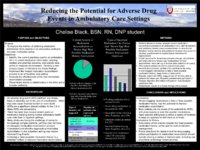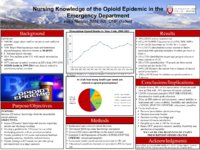The Graduate Nursing Project collection includes Doctor of Nursing Practice (DNP) Scholarly Projects and Master's students' non-thesis projects submitted as part of program requirements.
TO
1 - 25 of 6
| Title | Creator | Date | Description | Relation Is Part Of | ||
|---|---|---|---|---|---|---|
| 1 |
 |
Reducing the Potential for Adverse Drug Events in Ambulatory Care Settings | Black, Chelise | 2017 | POSTER | Graduate Nursing Project, Doctor of Nursing Practice, DNP |
| 2 |
 |
Layperson Naloxone Education and Our Opioid Overdose Epidemic | Noyes, Tiffany | 2017 | POSTER | Graduate Nursing Project, Doctor of Nursing Practice, DNP |
| 3 |
 |
Nursing Knowledge of the Opioid Epidemic in the Emergency Department | Nielson, Heidi A. | 2017 | POSTER | Graduate Nursing Project, Doctor of Nursing Practice, DNP |
| 4 |
 |
Development of an Opioid Guideline for Emergency Department Providers | Ericksen, Nicole | 2017 | The United States (U.S) is currently facing an opioid epidemic. Along with high addiction and death rates, Emergency Departments (ED) across the nation have been adversely affected by this epidemic. Individuals who use opioid medications, such as oxycodone, hydrocodone and oxycontin are four times m... | Graduate Nursing Project, Doctor of Nursing Practice, DNP |
| 5 |
 |
Reducing the Potential for Adverse Drug Events in Ambulatory Care Settings | Black, Chelise | 2017 | Adverse Drug Events (ADEs) are a significant clinical problem in the United States; many are preventable if a provider has full knowledge of patients' medications. The process of gathering medication information is known as medication reconciliation. There is currently an inadequate focus on medicat... | Graduate Nursing Project, Doctor of Nursing Practice, DNP |
| 6 |
 |
Layperson Naloxone Education | Noyes, Tiffany | 2017 | The Centers for Disease Control and Prevention (CDC) announced that the opioid overdose crisis is now a nationwide epidemic, with over 60% of overdoses being unintentional. Although many overdoses are from illegal opiates such as heroin, chronic pain patients taking prescription painkillers experien... | Graduate Nursing Project, Doctor of Nursing Practice, DNP |
1 - 25 of 6
